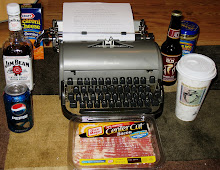I'm glad I went to journalism school when I did, and learned from the people I did and have had the career I've had. Because with people like Rebecca Maitland and Karen Zurawski around, newspapers will be dead in a decade. And when the corpse is buried I'll be glad to still be above ground, knowing I did it the Right Way.
This Houston Chronicle episode reminds me of a story my good friend Aaron tells about his first interview with a public relations firm, right out of college. As he's in there with one of the principals, another employee comes in with a quote typed on a sheet of paper. He asks the principal with whom Aaron is interviewing if the principal can just say what's written, so it can be properly described as a quote.
That's really not a whole lot different from Maitland's approach in constructing quotes and searching for someone to whom they can be attributed. But it gets the job of a reporter exactly wrong. As a reporter you dig, dig, dig for information and in the end you take what you get. If you're lucky and/or good, you get better stuff. If you're lazy, you won't get shit. When someone gives you the perfect quote for your story, but refuses to be named or even let you use the quote, you drop it. Does it suck? You bet. It's like getting handed a gold nugget, only to turn it over and find it's a painted turd.
But a gold turd is still a turd, and crap is no good. So you go back to work and keep digging. That's how it's done, people. Writing takes work; reporting takes work. Being a journalist is not supposed to be easy. You don't just get to ask your friends or colleagues to say shit and then shop the shit around hoping someone will take it.
Excuse my language, but this story stinks.
I don't know anything about Maitland as a journalist, but this is one stupendous lapse in judgment. And it's just compounded by Zurawski, who is supposed to be an editor. The proper response for a newspaper editor, when asked about a reporter who shopped quotes like Maitland appears to have done, is, "That's not how we do things here." Period. End of story. There's no need to sell your reporter out; you deal with it one-on-one, not in the media column of an alternative weekly. But you definitely make it clear that the behavior that was described to you is not how your reporters are expected to conduct themselves.
This isn't rocket science; it's journalism. I know it's Houston and that with the heat and humidity and the Johnson Space Center so close it might be easy to get confused and think things are more complicated than they really are. But they aren't. It's simple. To paraphrase Durham Bulls skipper Joe Riggins, journalism is a simple game: you report the story, you write the story, you publish the story. Got it?
Subscribe to:
Post Comments (Atom)




1 comment:
Not to make you feel guilty or anything, but where are your posts?? I'm not posting much either but I'm working on a few things. Trying to improve my output. I listened to the book Outliers (in the car) and learned that in order to get really good at something (whether it's computer programming, playing music, math, or whatever) you have to put in 10,000 hours. That's a lot of writing and I'm way behind. Does this count?
Post a Comment